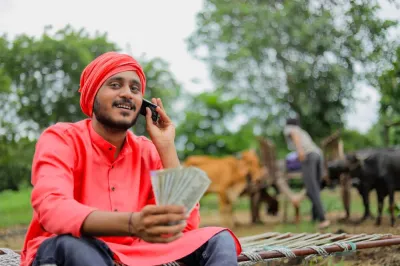Women in Haiti Become Community Health Entrepreneurs

Carine Roenen is the Executive Director of Fonkoze Foundation. She is a medical doctor with a Master's Degree in Public Health and has led multidisciplinary teams to design and implement development programs with Médecins sans Frontières, the Belgian Bilateral Cooperation and Concern Worldwide, before joining Fonkoze in 2009. Founded in 1994, Fonkoze is a family of organizations that work together to provide the financial and non-financial services to empower Haitians—primarily women—to lift their families out of poverty. Fonkoze won the European Microfinance Award 2021 for its healthcare program, Boutik Santé.
FinDev Gateway: Congratulations on winning the European Microfinance Award 2021, “Inclusive Finance and Health Care,” in recognition of Fonkoze’s healthcare program, Boutik Santé. What inspired Fonkoze to start this program?
Carine Roenen: Thank you very much. It all started in 2006, when a survey on the reasons for microcredit dropouts revealed to us that between 14 and 19 percent of microfinance clients were unable to maintain their business because of catastrophic health expenses. Customer representatives also raised this issue at Fonkoze's annual general meetings, making clear the importance of addressing health issues for our clients. So we started to design a program that would allow us to integrate health into microfinance operations.
Our first pilot was to seek partnerships with an existing healthcare offer, but it didn’t work out because the Haitian health system is too fractioned. Then we teamed up with Global Partnerships and the Inter-American Development Bank to set up a package of curative services for $1 a month. Unfortunately, that program didn't work out either because the healthcare provider was too expensive and our clients preferred to invest their money elsewhere.
Finally, in 2014, we launched the Boutik Santé (community health store) social franchise initiative to provide over-the-counter health, nutrition and hygiene products, as well as health and nutrition training and basic screening in rural areas.
FinDev: How does Boutik Santé work?
Carine: Boutik Santé is a social franchising program that brings health products, education and services to rural Haiti. It builds on Fonkoze’s core microfinance model of solidarity lending, in which women form groups of about 20 members to manage group loans and support each other. During the groups’ monthly meetings with loan officers, Fonkoze nurses present Boutik Santé to the groups’ leaders. Those who are interested in joining can then register and pay a fee to become a member of Boutik Santé, where they receive training in business management, as well as on health products, nutrition, reproductive health, hygiene and other areas.
Once they are trained, they become Community Health Entrepreneurs (CHE) who can conduct basic health screenings for members of their community, such as for malnutrition, hypertension and pregnancy. They share their knowledge with the community through health education sessions and they also resell health, hygiene and nutrition products purchased in bulk by Fonkoze. These products include acetaminophen, antibacterial soap, alcohol swabs, pregnancy tests, sanitary protection, food supplements, disinfectants and solar lighting products.
The environment in Haiti is particularly complicated with blocked roads, insecurity and natural disasters. We had to develop a flexible practice and take care of the entire supply chain ourselves.
FinDev: What kind of impact have you seen from this program since it was launched in 2014?
Carine: As of today, 38 of our 45 branches offer Boutik Santé. The cascade training model we use has been effective in changing behavior and has notably reduced the rate of anemia in children. Surveys reveal that 66 percent of residents in areas served by Fonkoze have directly benefited from Boutik Santé's products and services. The program potentially increases access to these products for more than 3.3 million Haitians.
Through this program,
- 80,290 malnutrition screenings were conducted in 2020.
- 37,444 health education sessions were delivered in 2020.
- 52,769 children received vitamin A supplements in 2020.
- Approximately 100,000 children under five years of age per year were screened for five years, allowing us to identify 11,800 malnourished children and to ensure that 84 percent were treated and completely cured, with a relapse rate of less than 1 percent.
FinDev: What were some of the lessons you learned while implementing Boutik Santé?
Carine: We learned quite a lot through this process. Four lessons in particular come to mind:
- We had to test several models before designing one that could be scaled in the long-term. You have to try, adapt, learn and evolve according to the reality on the ground.
- The environment in Haiti is particularly complicated with blocked roads, insecurity and natural disasters. We had to develop a flexible practice and take care of the entire supply chain ourselves.
- Boutik Santé only exists thanks to the microfinance network already in place. None of these women could live on Boutik Santé's income alone. It is a business in addition to their other economic activities.
- If we could go back in time, we would implement a stronger financial management system early on to track Boutik Santé's profitability.
FinDev: How has the COVID-19 pandemic affected Boutik Santé? Have you seen a greater need among your clients for this program during the pandemic?
Carine: In March 2020, when the first cases appeared on the island, we had to adapt our modus operandi. For example, we organized our supply sessions in small groups and trained the CHEs to prevent COVID-19.
However, after a few months, it appeared that the virus was not causing a major epidemic with overloading of hospital services or excess mortality. The virus is undoubtedly circulating, but the testing capacity is very low in Haiti. The pandemic has had little influence on the daily lives of Haitians and therefore has very little impact on the operations of Boutik Santé, as opposed to the security issues and socio-political risks.
Making sure our staff is supported is a key priority... Our employees are very brave and committed.
FinDev: Indeed, MFIs in Haiti already face many challenges that can make it difficult to operate, such as political uncertainty and extreme poverty. How do you address these challenges?
Carine: Making sure our staff is supported is a key priority. In 2018, we went through a particularly intense episode of socio-political unrest which led us to close our offices. As a result, we established employee support mechanisms such as workshops with psychologists to help people manage chronic stress. We are currently preparing a workshop to control emotions in the event of extreme events, such as a kidnapping or an earthquake. We also use multiple tools to share safety messages.
Our employees are very brave and committed. We emphasize flexibility: no one has specific schedules and we have helped our employees to equip their homes with internet and electricity so that they can also work from home.
However, we are seeing more and more middle-class people breaking down and leaving the country. The last few months have been complicated because in addition to security problems, there has been a serious shortage of fuel which we need to get to rural areas on motorcycles.
FinDev: Going forward, what do you see as key priority areas for Fonkoze?
Carine: Given our challenging environment, it is important to build durable structures. We need to work on further institutional strengthening. This implies a solid operational model, while also maintaining a certain scale in order to cover salaries for our core team.
We also want to expand Boutik Santé and perhaps add some additional income-generating activities to help improve the organization’s stability and sustainability so as not to rely so heavily on donors.


